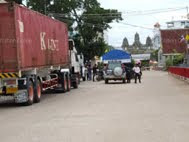Written by DAP NEWS -- Thursday, 24 September 2009
(KHMER HOT NEWS)
The visit of Cambodian Defense Minister Tea Banh, also a Deputy Prime Minister, to the US for several days has borne fruit for both nations’ cooperation, with the US Government vowing to strengthen its relationship with the Cambodian Government.
Deputy Prime Minister Tea Banh is currently in Washington D.C. on a fourday visit aimed at strengthening cooperation and reinforcing the US’ commitment to a substantive, reform- linked security cooperation, according to a Wednesday press release from the US embassy in Phnom Penh.
“Secretary Gates stressed the commitment of the US to enhance Cambodia’s capabilities in peacekeeping, maritime security and coun- terterrorism,” said the press release. “The Secretary cited establishment of a Cambodian Defense Attaché office in Washington and the newly minted sister state program with Idao’s National Guard as positive developments in the bilateral relationship.”
In a separated meeting, Deputy Secretary Steinberg and Tea Banh discussed security cooperation between the US and Cambodia, highlighting Cambodia’s ongoing support for international peacekeeping operation and Cambodia’s commitment to host the 2010 Global Peace Operations Initiative (GPOI) regional capstone exercise. GPOI is a US funded G-8 program to expand global capacity to train and equip 75,000 peacekeepers by 2010. They also discussed human rights and issues related to Cambodia’s role as an ASEAN member.
“Since 2004, the US has sought to strengthen and expand its bilateral defense relationship with Cambodia,” the statement said. “Our cooperation focuses on international peacekeeping, counterterrorism, counter narcotics, border and maritime security, humanitarian assistance, disaster relief operation, and defense sector reform. Our goals are to develop the capabilities of the Royal Cambodian Armed Forces (RCAF) in these areas, while encouraging Cambodia’s commitment to the rule of law, transparency in governance, sustained democratic development, and respect for human rights.”
Since 2006, Cambodia has received approximately US$4.5 Million worth of equipment and technical assistance through the Foreign Military Financing (FMF) program. The US has also provided humanitarian assistance. Since 2005, the US Army, Navy, and Marine Corps have helped to build and republish schools and medical clinics throughout the country.
US military medics and dentists have also worked with their RCAF counterparts to provide free health care to some of the most isolated and impoverished communities in Cambodia.
[ Click Read More ]
(KHMER HOT NEWS)
The visit of Cambodian Defense Minister Tea Banh, also a Deputy Prime Minister, to the US for several days has borne fruit for both nations’ cooperation, with the US Government vowing to strengthen its relationship with the Cambodian Government.
Deputy Prime Minister Tea Banh is currently in Washington D.C. on a fourday visit aimed at strengthening cooperation and reinforcing the US’ commitment to a substantive, reform- linked security cooperation, according to a Wednesday press release from the US embassy in Phnom Penh.
“Secretary Gates stressed the commitment of the US to enhance Cambodia’s capabilities in peacekeeping, maritime security and coun- terterrorism,” said the press release. “The Secretary cited establishment of a Cambodian Defense Attaché office in Washington and the newly minted sister state program with Idao’s National Guard as positive developments in the bilateral relationship.”
In a separated meeting, Deputy Secretary Steinberg and Tea Banh discussed security cooperation between the US and Cambodia, highlighting Cambodia’s ongoing support for international peacekeeping operation and Cambodia’s commitment to host the 2010 Global Peace Operations Initiative (GPOI) regional capstone exercise. GPOI is a US funded G-8 program to expand global capacity to train and equip 75,000 peacekeepers by 2010. They also discussed human rights and issues related to Cambodia’s role as an ASEAN member.
“Since 2004, the US has sought to strengthen and expand its bilateral defense relationship with Cambodia,” the statement said. “Our cooperation focuses on international peacekeeping, counterterrorism, counter narcotics, border and maritime security, humanitarian assistance, disaster relief operation, and defense sector reform. Our goals are to develop the capabilities of the Royal Cambodian Armed Forces (RCAF) in these areas, while encouraging Cambodia’s commitment to the rule of law, transparency in governance, sustained democratic development, and respect for human rights.”
Since 2006, Cambodia has received approximately US$4.5 Million worth of equipment and technical assistance through the Foreign Military Financing (FMF) program. The US has also provided humanitarian assistance. Since 2005, the US Army, Navy, and Marine Corps have helped to build and republish schools and medical clinics throughout the country.
US military medics and dentists have also worked with their RCAF counterparts to provide free health care to some of the most isolated and impoverished communities in Cambodia.




